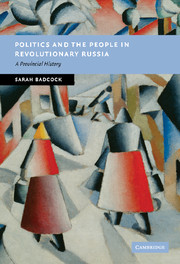Book contents
- Frontmatter
- Contents
- List of figures and table
- Notes on the text
- Acknowledgements
- Maps
- 1 Introduction
- 2 The February revolution: whose story to believe?
- 3 The Socialist Revolutionary Party and the place of party politics
- 4 Choosing local leaders
- 5 Talking to the people and shaping revolution
- 6 Soldiers and their wives
- 7 ‘Water is yours, light is yours, the land is yours, the wood is yours’
- 8 Feeding Russia
- Conclusions
- Bibliography
- Index
- NEW STUDIES IN EUROPEAN HISTORY
3 - The Socialist Revolutionary Party and the place of party politics
Published online by Cambridge University Press: 10 August 2009
- Frontmatter
- Contents
- List of figures and table
- Notes on the text
- Acknowledgements
- Maps
- 1 Introduction
- 2 The February revolution: whose story to believe?
- 3 The Socialist Revolutionary Party and the place of party politics
- 4 Choosing local leaders
- 5 Talking to the people and shaping revolution
- 6 Soldiers and their wives
- 7 ‘Water is yours, light is yours, the land is yours, the wood is yours’
- 8 Feeding Russia
- Conclusions
- Bibliography
- Index
- NEW STUDIES IN EUROPEAN HISTORY
Summary
The newly democratised political system placed party politics at the very heart of political debate and discourse. The new political elite presented political parties as the vehicles by which ordinary people could participate in political life and shape Russia's future. If we move away from elite politics, however, political parties often played a very low-key role in grass-roots politics and in people's daily life. In order to understand the role of political parties, we must try to establish how ordinary people related to political parties. Support for a political party was the most widely recognised way for individuals to express political will, and this support is often used as an indicator for the opinions, moods, feelings and motivations of the population. It is relatively straightforward to estimate support for political parties using voting statistics and membership figures. What this support, manifested in voting and party membership, might actually signify about the political attitudes of those offering it has not been adequately explored.
This chapter will tackle the difficult problem of popular understandings by focusing on the Socialist Revolutionary Party (PSR). The PSR cannot be used to represent the experiences of all political parties. As we will see from this study of the PSR's foundations and support, the genesis of party political support was caught up in a complex network of social, historical and psychological factors, which were particular to the party.
- Type
- Chapter
- Information
- Politics and the People in Revolutionary RussiaA Provincial History, pp. 56 - 86Publisher: Cambridge University PressPrint publication year: 2007
- 1
- Cited by

